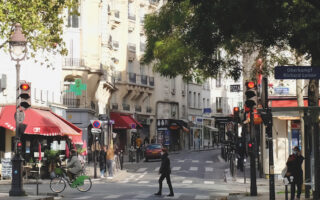Parisian Language and Culture: A Guide for International Visitors


- SUBSCRIBE
- ALREADY SUBSCRIBED?
BECOME A BONJOUR PARIS MEMBER
Gain full access to our collection of over 5,000 articles and bring the City of Light into your life. Just 60 USD per year.
Find out why you should become a member here.
Sign in
Fill in your credentials below.
Ever wondered how to prepare for your trip or move to Paris? This guide is for you! Whether you’re a tourist, expat, or someone who is simply passionate about France, you can learn practical tips on how to adapt to life in France, where to go if you need help, and some “survival French” phrases that are a must-know in various situations.
French Customs
La Bise
La bise (kisses on each cheek) is one of the most well-known customs in France. Whether you’re meeting someone for the first time or known them for years, expect la bise!
There are a few rules when it comes to this greeting. First, several different places follow this tradition, but not everyone does it the same. In Paris, for example, I’ve found that most people start on the left cheek and only give two kisses. In other parts of France and in other countries, they may start differently or give multiple kisses.
In addition, la bise is often given according to gender. Men give la bise to women; women give la bise to women; and women give la bise to men. Men do not generally give la bise to each other, and it’s more common to see them shaking hands or bumping fists.
If you’re ever unsure of someone’s gender or prefer not to do la bise, a simple handshake or fist bump usually works just as well. As everyone did during the height of the Covid-19 pandemic, the French found alternate means of saying hello, so many are understanding if you prefer to avoid la bise. But be cautious about giving hugs—some French people, especially those you don’t know well, will feel uncomfortable with a hug.
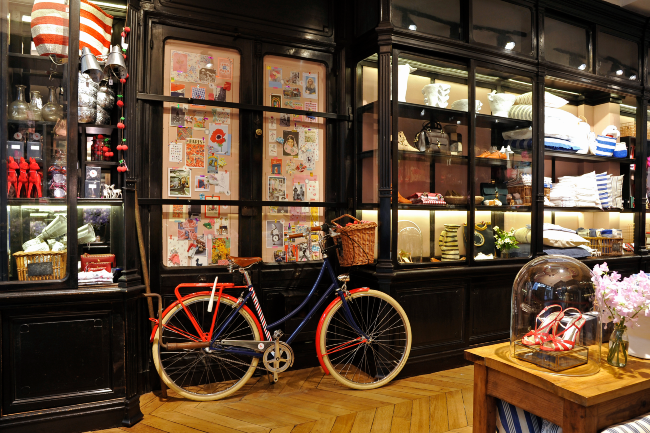
Inès de la Fressange boutique on rue de grenelle, Paris
Say “Bonjour” When You Enter a Shop
When you enter any store or building, you should greet the shopkeeper or receptionist with a friendly “Bonjour.” This applies to clothing stores, boulangeries, museums, gyms, offices…you name it, you should say hello! If you follow this important tradition, people are more likely to be polite to you because you were polite to them and showed them that you understand and respect their traditions.
As you leave a shop or building, be sure to say “Merci” and/or “Au revoir.” You can add a “Bonne journée” in if it’s during the day, and “Bonne soirée” if it’s in the evening.
Tu vs. Vous: What’s the Difference, and When Should I Use Them?
For the more experienced traveler or expat who speaks French, figuring out whether to use “tu” or “vous” during everyday conversations can be a real challenge. In general, here are some rules of thumb to help you discern the appropriate pronoun for the situation.
- If you are speaking to someone older than you or in a position of power, use “vous.”
- If you are in a more formal situation, such as at a doctor’s appointment, use “vous.”
- If you are in a casual situation with friends or people your age or younger, use “tu” to address each person individually, and use “vous” to address multiple people or the entire group.
If you’re ever unsure which word to use, try “vous” first. It’s better to be more formal and make a mistake than to use “tu” and accidentally offend someone. Luckily, many French people are understanding of foreigners making this kind of mistake, and they’ll be happy to correct you.
You may also run into situations where someone you would normally address as “vous” asks you to address them as “tu.” In this case, they may ask you, On peut se tutoyer ? meaning, Can we use “tu” between us? The opposite of tutoyer would be vouvoyer, meaning to call someone by “vous.”
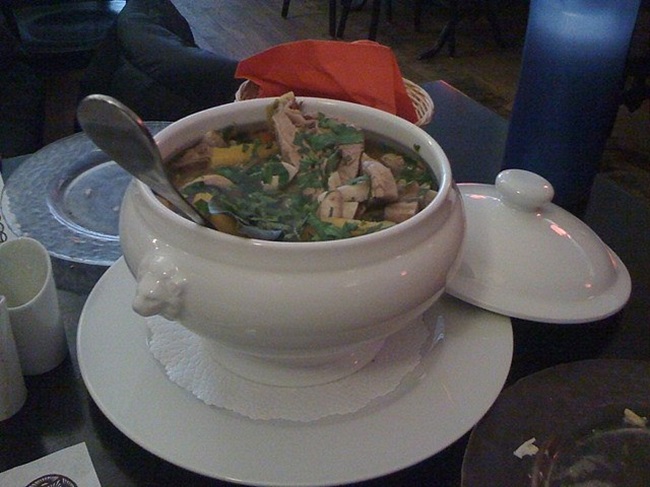
Pot-au-feu dans son bouillon. Photo Credit: akosma/ Wikimedia Commons
The Importance of Mealtime
Food and enjoying a meal with others are extremely important in French society. Mealtimes are social activities where talk of work is considered taboo, and being rushed can feel offensive. While touristy cities like Paris feature restaurants with international cuisines and fast service, classic French restaurants tend to run at a slower, more relaxed pace. In addition, some restaurants may be closed during off hours, generally between 3 and 7 p.m. Others may still offer beverages while the kitchen remains closed, some offer “service continu,” meaning their full menu is available during all opening hours.
While you’re more likely to find completely closed restaurants in smaller French towns, various Parisian cafés and restaurants also follow these off-hour closing times. Even though you can always find someplace that’s open in the city, you may need to do some research first.
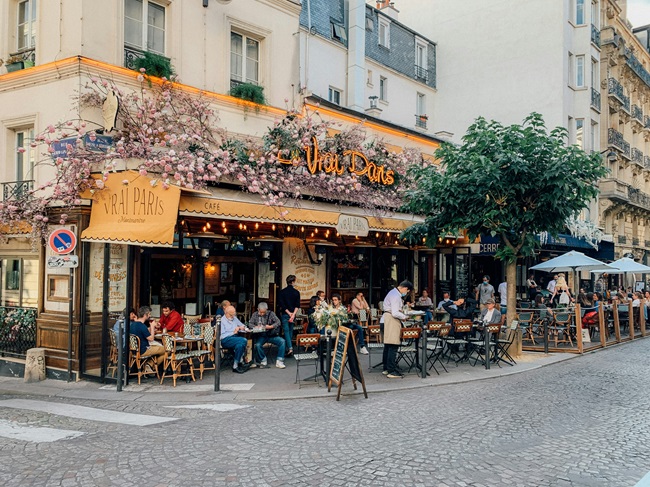
Photo: Alex Harmuth/Unsplash
Métro Etiquette
The Métro system, a series of under- and above-ground urban trains, is Paris’s most well-known form of public transportation. The Paris region also offers public transportation in the form of buses, trams, RER, and suburban trains. For any questions or concerns while using public transportation in Paris, you can talk to an RATP representative or look on the official website. The RATP is the Parisian transport authority, so they are the official source for all of your public transportation needs while in Paris.
Whenever you’re on any form of public transportation, but the Métro in particular, there are some spoken — and unspoken — rules that everyone should follow.
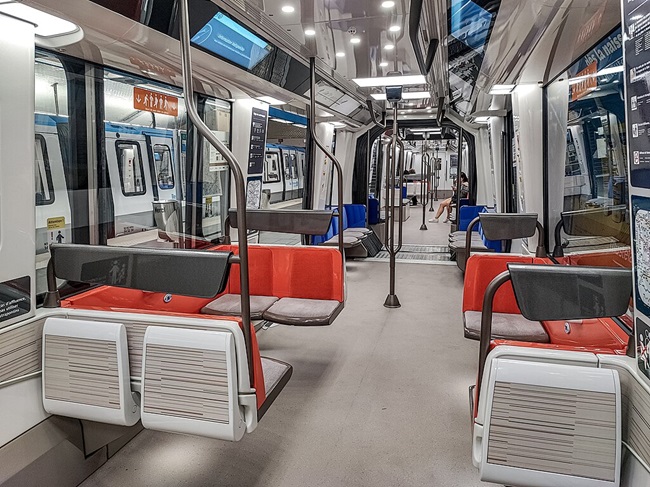
Interior of the metro line 11. Photo: Capitaine AdBlock/Wikimedia Commons
Don’t sit in the folding seats during rush hour.
Folding seats, called “strapotins,” are placed near the doors of each Métro and RER train, and while they are convenient for people who are staying on for only a few stops, these seats cannot be used during rush hour or whenever the train gets busy. This rule is posted in every train car, as well as the rule that these seats should be given first priority to children, pregnant people, elderly folks, and people with disabilities.
Don’t block the doors when people are trying to exit.
The last thing you want when traveling on the busy Métro is to miss your stop because people are blocking the doors. You don’t want to be the person blocking them, either. Whenever I stand near the doors, I like to check if anyone is getting ready to leave as we approach each stop. If so, I move out of the way or step out of the train for a moment to let them pass. In general, be aware of your surroundings and listen for a “Pardon” or “Excusez-moi” from those trying to exit.
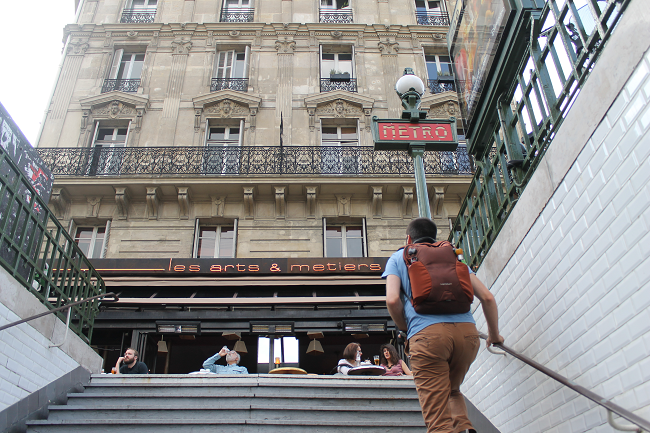
Exiting the metro at Arts et Métiers. © Connie Ma/Wikimedia Commons
Don’t talk too loudly, don’t be on the phone, don’t be a disruption.
During a civics class for immigrants that I was required to take through the OFII (French Office for Immigration and Integration), I learned that part of the Parisian culture is to be quiet on the Métro. Just the other day, I saw an advertisement from the RATP that said, as a rough translation, “In real life, no one wants to hear a concert of your audio messages.”
While there are certainly Parisians who enjoy having a conversation or need to make a phone call while on the Métro, many sit quietly with headphones or a book. In fact, talking loudly or causing a disruption can be met with a complaint to RATP security, conflicts that slow down traffic, or a higher likelihood of being pickpocketed, as you may be signaled out as a tourist and easy target.
How to Avoid Tourist Traps
Be aware of your surroundings, especially near tourist attractions.
While tourist attractions generally have some security measures in place or guards walking around the area, incidents of pickpocketing and scamming still happen. Always be aware of your surroundings in crowded areas. In particular, avoid street shows, as they may be scams to take your money or might be frequented by pickpockets.
You may also want to avoid restaurants near attractions like the Eiffel Tower and the Louvre, as they are often overpriced. You can find quality meals from all different cuisines in Paris, but traveling away from the city center allows you to find better prices and more variety.
Finally, always double check that you are not getting charged extra for your purchases, and make sure you receive the right change. If you have never used the euro system before, familiarize yourself before you travel. While I have rarely run into a situation where someone tries to rip me off, it does happen, even to people who speak French.

The Louvre pyramid at night. © Thinkstock
Do not buy Métro tickets from people on the streets.
While I’ve never seen people selling Métro tickets on the streets, I know they exist —because I often hear an announcement that warns us not to buy tickets from them! Even though these tickets may seem legitimate or cheaper, you must buy tickets from the official machines inside the Métro stations or from the booth where RATP employees work. It’s safer and will help you avoid trouble if random ticket checks occur while you’re traveling. (If you have an invalid ticket or Navigo pass during a check, you will be fined 55 euros: When paid within 60 days.)
Take only official Parisian taxis.
All taxis should have a clearly visible number, have a sign that says “Taxi Parisien,” and use the meter system when taking you around the city. The only routes that have mandated fixed rates are those to the airports; any other routes should be calculated using the meter.
However, many taxis get by with a number and the “Taxi Parisien” sign but will overcharge people, claim there’s a nighttime fixed rate, or seem suspicious. If you fall victim to this or notice something suspicious, you can take their taxi number (posted on the right-hand side of the dash) and report them to the police.
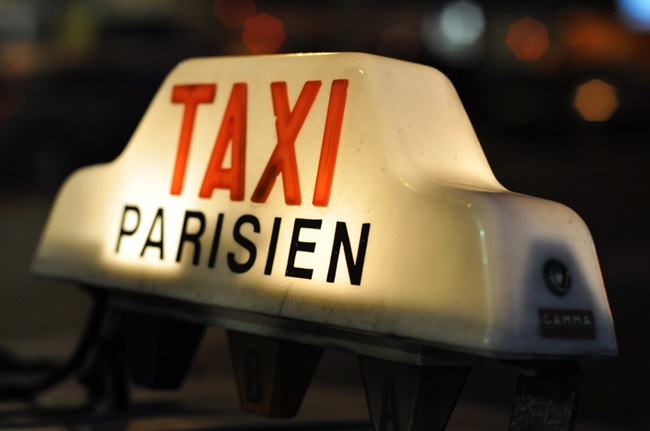
Taxi Parisien, Photo by: Rob-In-Transit/Flickr
Safety Tips When Visiting France
Sign up for your home country’s travel registry.
Some countries offer travel registries where citizens can sign up to indicate the dates of their trips to various countries. When I studied abroad in Paris, my program recommended that we use the U.S. travel registry, STEP (Smart Traveler Enrollment Program), which also provides travel advisories and safety alerts for several countries. I studied abroad in early 2022, so this was especially helpful during the height of the Covid-19 pandemic to monitor the disease and inform us of any spikes in cases. However, this tool is also helpful to stay informed about increased hostility, protests, natural disasters, family emergencies, and other situations.
Know the address of your stay.
Whether you’re staying with a friend, in an Airbnb, or at a hotel, you should know the address off the top of your head. You may need to provide this information to the French authorities upon landing in France, and it’s always helpful to know for GPS purposes or in case of an emergency.
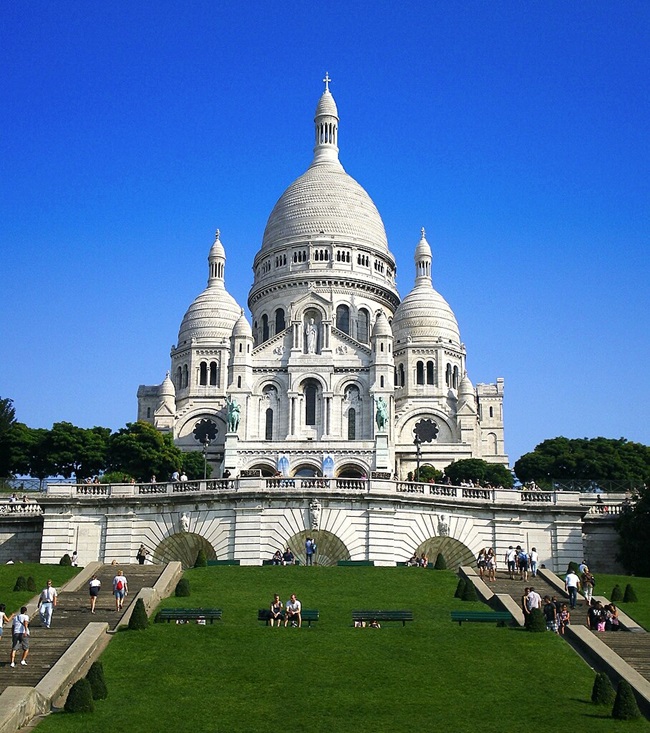
South facade of the Basilique du Sacré-Cœur de Montmartre. Photo Credit: Tonchino
Keep your ID on hand.
Have a valid form of ID on you at all times, and take care not to place in a location that is easy for pickpockets to grab.
Know where your home country’s embassy is.
Know where your home country’s embassy or consulate is, if applicable. For example, the U.S. Embassy in Paris is located at 2 Avenue Gabriel in the 8th arrondissement, near the Place de la Concorde and Jardin des Tuileries. While you will likely not need to use embassy services during a vacation or short-term stay, they are welcoming places for expats and can provide essential information for non-French citizens, such as trusted medical institutions, international and bilingual schools, job opportunities, and ballot drop-offs during your home country’s elections.
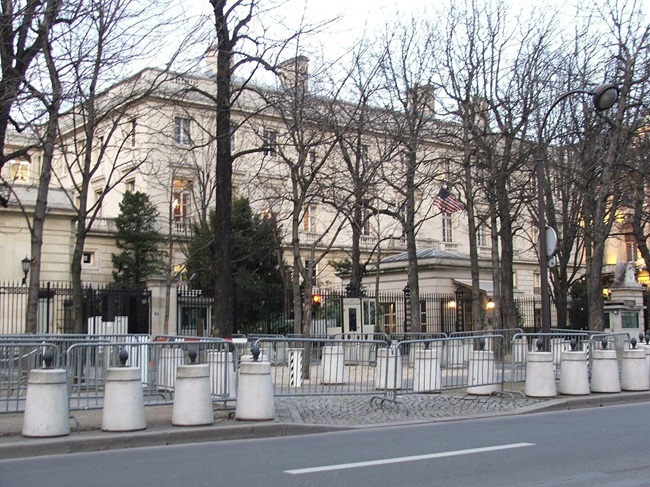
Embassy of the United States in Paris. Photo Credit: Krokodyl
Know who to call in case of emergency.
In France, there are four emergency numbers you should memorize:
- Fire (Sapeurs-Pompiers): 18
- Police: 17
- Medical (SAMU): 15
- General Emergency: 112 (This is the general emergency number for all of Europe, so it’s better to call a more specific French number if possible.)
When I first traveled to France, I put these numbers as contacts in my phone for easy access. You may also want to consider registering emergency contacts in your home country with a program such as STEP, or list them inside your wallet or another easily accessible location in case of an incident.
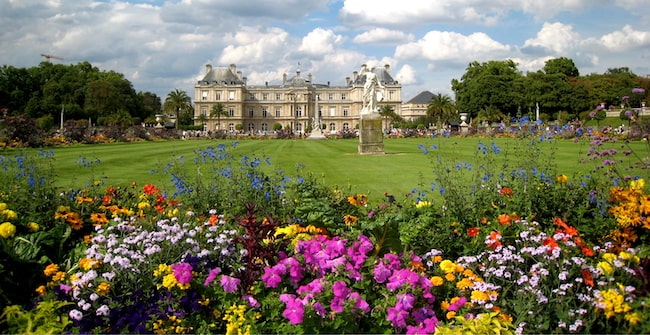
Jardin du Luxembourg. Photo credit: Rdevany/ Wikimedia commons
Make sure your cell phone works abroad.
While some phone plans come with international service built in, others do not. It’s a good idea to check with your service provider before going abroad to ask if you need to sign up for an international service plan and/or if you’ll be charged for international service, texts, and calls while abroad. If you need to buy a special plan during your time away, be sure to choose a plan that gives you enough of what you need without breaking the bank. If you’re moving to France or staying for longer than a few months, it’s easier and cheaper to purchase a French SIM card and get a French number. This process is relatively simple, and you can keep your old SIM card and phone number if you’ll be using them later.
In addition, be sure to bring the proper chargers to France that fit their plugs (Type C and Type E). You’ll likely need a plug adapter, but remember that these are not the best to use with larger appliances such as hair dryers and fans.
Make sure your credit/debit cards work abroad.
Similarly to your phone, make sure your credit or debit cards work abroad. When verifying this information with your bank, you’ll also want to check if there are any international fees associated with using your cards or withdrawing cash while in Paris. If you’re vacationing in France and prefer to bring a large amount of cash with you to avoid foreign withdrawals, be sure to keep it safely locked in your hotel room or Airbnb.
Keep an eye on your valuables.
Speaking of valuables, always keep an eye on your personal items. Pickpocketing and thievery happen every day in Paris, even to the most seasoned expat—and to French people themselves. Use bags or backpacks that can be securely closed, and keep them close to your body when in crowded areas. Look out for your friends as well. When in restaurants or cafés, avoid hanging your bag or jacket on your chair if they hold any valuables. For all electronic devices, but iPhones in particular, keep them out of sight and safely packed up until they’re needed. Phones can be easily swiped from tables or pockets in busy areas.
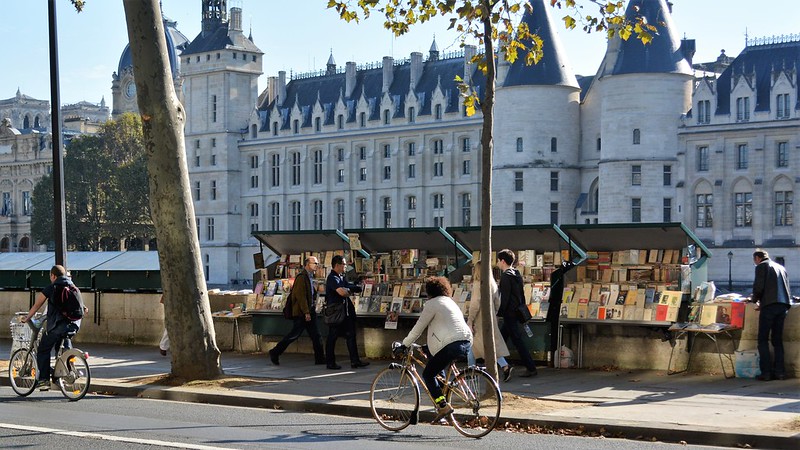
Through the Café Window. Photo credit: Carl Campbell / Flickr
Bring enough of any medications you may need while abroad.
If you’ll need to take medications from your home country during your time in Paris, many doctors can give you enough prescriptions for the period of time that you’ll be away. If you’ll need to stock up on medications while in France, make sure a French doctor can prescribe the same or a similar medication. You will usually need to look up the scientific name, not the brand name, of your medication to see if it exists in France.
The beauty of universal health insurance in France is that you can visit a doctor to get a prescription for an affordable cost, even if you don’t have a Carte Vitale, or French health insurance card. Many pharmacies also sell over-the-counter remedies for maladies like the common cold, upset stomach, muscle pain, etc. However, be aware that some medications that don’t normally need a prescription in your home country may need one in France.
Survival French Phrases
In an Emergency
- Fire (Sapeurs-pompiers): 18
- Police: 17
- Medical (SAMU): 15
- General Emergency: 112
- Interdit(e) – Forbidden
- Sortie – Exit
- Au secours ! – Help!
- Je suis perdu(e). – I’m lost.
- Où est… – Where is…
- Police – Police
- Sapeurs-pompiers – Firefighters
- SAMU – Ambulance / EMS
- Mon adresse est… – My address is…
- Je suis à… – I’m at…
In the Métro
- Pardon – Sorry; Excuse me
- Excusez-moi – Excuse me
- Est-ce que je peux passer avec vous ? – Can I pass with you? (People without tickets may ask this as you go through the turnstiles—while many of them are innocent, some may be pickpockets, so it’s safer to say a polite “non” and keep moving.)
- Escaliers – Stairs
- Ascenseur – Elevator
- Sortie – Exit
Greetings/Closings
- Bonjour – Hello (day & evening)
- Bonsoir – Hello (evening only)
- Bonne journée – Have a good day
- Bonne soirée – Have a good evening
- Au revoir – Goodbye
- Enchanté(e) – Nice to meet you
- Je viens de… – I’m from…
- Je parle anglais. – I speak English.
- Je ne parle pas français. – I don’t speak French.
- Je parle un peu français. – I speak a little French.
Ordering Food & Drinks
- Je vais prendre… – I’ll take…
- Je voudrais… – I would like…
- Oui / Non – Yes / No
- S’il vous plaît – Please
- Merci – Thank you
- De rien – You’re welcome
- Pas de problème – No problem
- Je suis allergique au… – I’m allergic to…
- L’addition, s’il vous plaît – Check, please
- Beaucoup / pas beaucoup – A lot / not a lot
- Un peu – A little bit
- Une boisson – A drink (usually in a can)
- Un verre (d’eau) – A glass (of water)
- Une carafe d’eau – A pitcher of water (for the table)
- Une bouteille d’eau – A water bottle
- Ça coûte combien ? – How much does that cost?
- Ça sera tout ? / Ça sera tout. – Will that be all? / That will be all.
- Vous payez comment ? – How are you paying?
- Par espèces – With cash
- Par carte – With a credit/debit card
Basic Questions & Responses
- Où sont les toilettes ? – Where is the restroom?
- Les toilettes sont… – The restroom is…
- Comment tu t’appelles ? / Comment vous vous appelez ? – What’s your name ?
- Je m’appelle… – My name is…
- Vous cherchez quoi / qui ? – What/who are you looking for?
- Je cherche… – I’m looking for…
- Comment ça va ? – How’s it going / how are you doing?
- Ça va bien / ça va pas bien – I’m doing well / I’m not doing well
- Vous avez quel âge ? / Tu as quel âge ? – How old are you?
- J’ai ___ ans. – I am ___ years old.
Lead photo credit : Photo by: Fabien Maurin/Unsplash
More in culture, language, learn french
